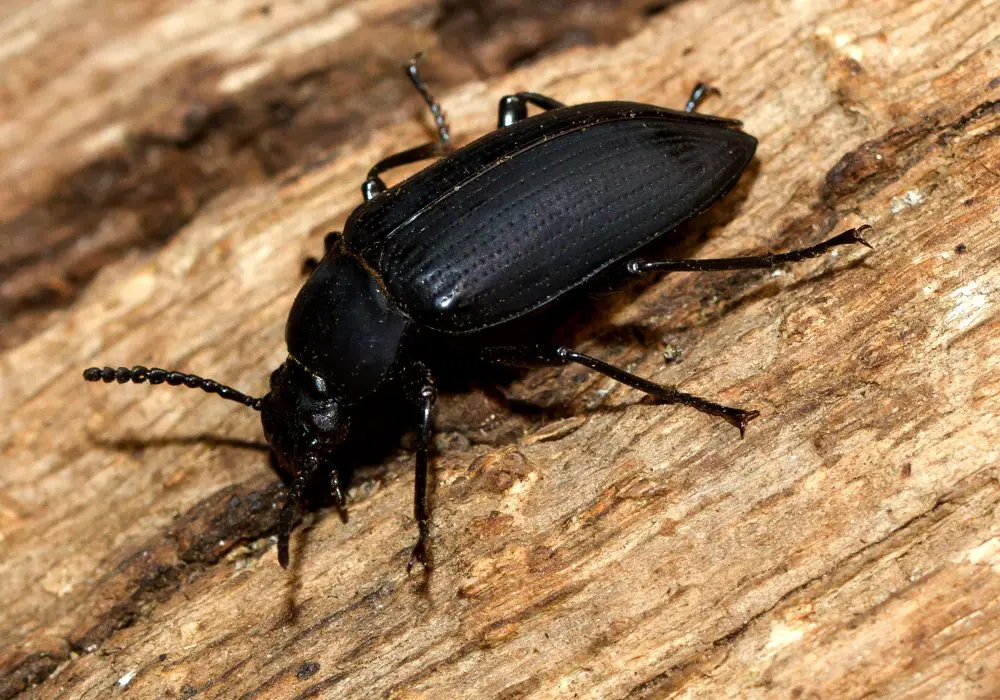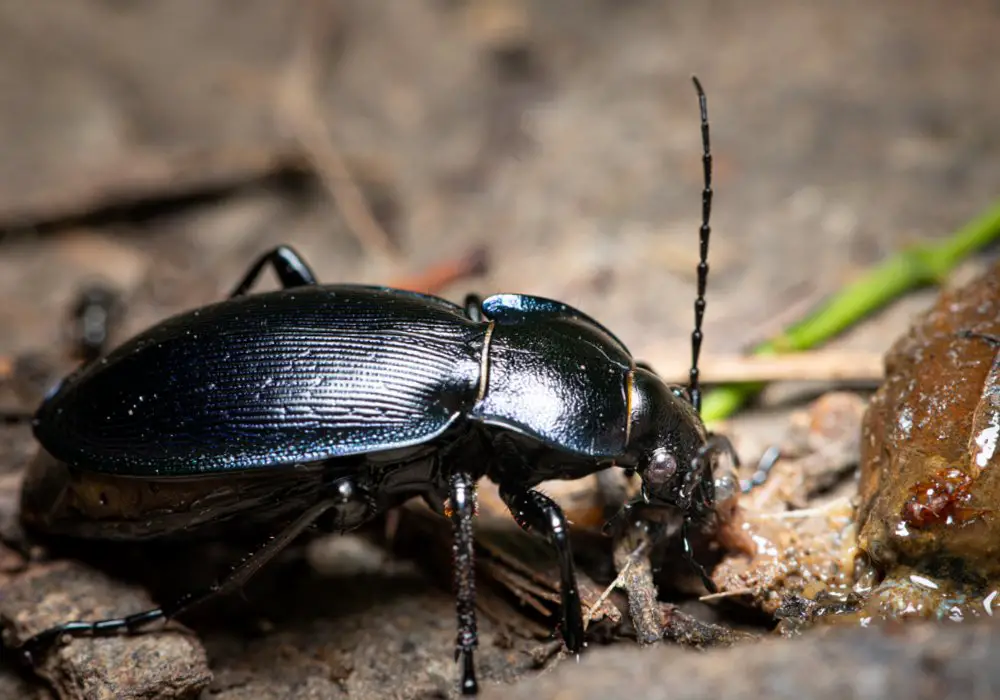Ground beetles are a common presence in gardens and yards.
While these insects can be beneficial by preying on pests like aphids and snails, they can also become a nuisance when their population grows unchecked.
Quick Answer:
- Remove Habitat: Clear away leaves, woodpiles, or debris where beetles tend to hide.
- Seal Entrances: Caulk or seal cracks and openings in your home’s foundation, windows, or doors.
- Diatomaceous Earth: Sprinkle food-grade diatomaceous earth around areas where you’ve seen beetles.
- Lighting: Adjust outdoor lighting as bright lights attract beetles. Use yellow or sodium vapor light bulbs instead.
- Beneficial Predators: Encourage natural beetle predators, like birds and spiders, by creating a friendly habitat for them.
For those wanting to keep their outdoor spaces free from harmful chemicals, finding safe and natural ways to get rid of ground beetles can be essential in maintaining a healthy and balanced ecosystem.
Implementing these natural beetle control strategies requires understanding both the habits of ground beetles and the conditions that lead to their proliferation.
Understanding Ground Beetles
Ground beetles are a large group of insects belonging to the family Carabidae. There are over 35,000 known species of ground beetles worldwide, which come in various sizes and colors.
While they may appear alarming due to their shiny black appearance and the way they move quickly, ground beetles are generally considered to be beneficial insects.
The adults and larvae of ground beetles are predatory in nature, which means they help control populations of other pests in the garden. They mainly feed on other insects, such as small slugs, snails, and caterpillars.
Some species are also known to consume the eggs of other pests. Ground beetles have elongated bodies, and their key identifying feature is a pair of large, black, shiny wing covers with noticeable ridges, as well as their thread-like antennae.
Ground beetles are most active during the night, which is when they come out to hunt for their prey. During the day, they prefer to remain hidden under rocks, logs, or leaf litter, where they can avoid sunlight and predators.
Although these beetles are harmless to humans and rarely pose a threat to crops, their presence can sometimes be overwhelming, especially when they gather in large numbers.
Recognizing the Signs of Infestation
Ground beetles are often found in gardens and lawns, occasionally making their way indoors. They cause damage to leaves, flowers, and plants, sometimes even trees. To effectively manage an infestation, it is crucial to recognize the signs.
Here are some indicators that suggest ground beetles have invaded your space:
- Leaves and plants: Look for damaged leaves with holes or irregular edges. Ground beetles typically chew small holes, and irregularities might reveal their feeding habits. They also cause wilting and discoloration in plants.
- Soil: Ground beetles tunnel through the soil to lay eggs, causing disruption in your garden. Notice if parts of the lawn appear disturbed or if there are mounds of dislodged soil. These may indicate beetle activity.
- Areas: Your garden, lawn, flower beds, and trees are all potential habitats for ground beetles. Inspect these areas regularly for signs of infestation, especially around tree trunks and the base of plants.
Keep in mind that while ground beetles may cause some harm to your garden, they can also be beneficial by feeding on pests like slugs and snails.
However, when their population grows and outweighs the benefits, implementing natural control methods becomes essential.
Natural Methods to Get Rid of Ground Beetles

Ground beetles are common pests that can invade your home and garden. Although they are generally harmless, their presence can be quite annoying.
To control and get rid of these pests safely and naturally, consider using the following methods:
1. Diatomaceous Earth: This natural, non-toxic powder is an excellent pest control product that can be sprinkled around your home’s foundation, garden beds, and along the beetle entry points. Diatomaceous earth works by drying out the insects’ exoskeleton, eventually killing them.
2. Boric Acid: A natural and safe option, boric acid can be used to create a barrier around your home to prevent ground beetles from entering. Sprinkle the powder in areas where you suspect the beetles, such as door thresholds, window sills, and cracks in the foundation.
3. Natural Repellents: Essential oils such as eucalyptus, peppermint, and cedarwood can serve as excellent natural repellents against ground beetles. Mix a few drops of these oils with water in a spray bottle, and apply to areas where you have seen the pests.
4. Sticky Traps: Create simple and effective traps using double-sided tape or sticky boards. Place these traps along the edges of walls, under cabinets, and near doorways to catch ground beetles without using any chemicals.
5. Biological Control: Introducing beneficial insects like ladybugs, lacewings, and ground beetles can help control the beetle population in your garden. These insects feed on ground beetles and help keep their numbers in check naturally.
6. Maintenance: Keep your home and garden clean and free of debris, such as leaves and mulch piles, where ground beetles may hide. Sealing any exterior cracks and crevices and installing door sweeps can also help prevent beetles from entering your home.
Prevention and Habitat Modification

Ground beetles are attracted to environments that provide them with food and shelter. To prevent their invasion naturally, it’s crucial to modify their habitat and incorporate preventative measures in and around your home.
Firstly, eliminate sources of food and water for the beetles. Ensure that you do not leave any pet food or human food out in the open. Regularly clean the kitchen and dining areas to remove any crumbs or food residues. Maintain a tight seal on trash bins to prevent beetles from accessing them.
Additionally, avoid over-watering your plants and garden, as excess moisture can attract these insects. If you have any areas with standing water, try to address the issue by improving drainage or using sand to absorb excess water.
Next, focus on sealing any gaps or cracks around your home. Ground beetles can easily enter through small openings, so inspect your walls, foundation, windows, and doors for any gaps. Seal them using caulk or expandable foam to block their entry points.
Vacuuming regularly, especially in dark, confined spaces like under furniture or in closets, can help remove any potential hiding places for the beetles. Since they are more active during the night, ensure that you minimize clutter and keep your living area clean to discourage them from settling.
Each season comes with different challenges for beetle prevention. During warmer months, pay close attention to your outdoor environment and remove any decaying leaves or vegetation that could become a breeding ground.
In colder periods, focus on maintaining the integrity of your home’s seal to avoid providing the beetles with a refuge from the cold.
Physical Removal Techniques
One effective way to get rid of ground beetles naturally is through physical removal techniques. These methods involve capturing or repelling the beetles using certain tools and methods without harming the environment or the beetles themselves.
Traps can be an effective solution for reducing beetle populations. Some common traps include:
- Beetle traps: These are specifically designed to capture ground beetles. The traps can be purchased or homemade using items such as small containers and bait.
- Sticky traps: Placing sticky traps near areas where beetles are frequently seen can help catch them. Ensure that the trap is placed close to the ground, as this is where beetles tend to linger.
Encouraging natural predators can also help in controlling the ground beetle population.
Some predators of ground beetles include:
- Birds: Attract more birds to your garden by providing food, water, and nesting sites. Birds like robins and sparrows are known to feed on beetles.
- Ladybugs: It may sound strange, but ladybugs can help control ground beetles, especially their larval stages. Encouraging ladybugs in your garden can help maintain a balance.
Using a vacuum can be an effective way of removing beetles from indoor spaces. A handheld vacuum can be an especially useful tool in capturing these pests directly.
After vacuuming the beetles, you may release them outside, away from your property.
Biological Controls
Ground beetles, belonging to the family Carabidae, are considered pests by some due to their large population and occasional intrusion into homes. However, they can also be beneficial as they are natural predators of many insect species that might harm your garden or landscape.
Despite this, if you want to control their population without resorting to chemical means, there are various biological controls available.
Introduce beneficial insect predators: One effective way to reduce the ground beetle population is by introducing other insects that prey on them, thus keeping their numbers in check.
Ladybugs, for example, are a group of beetles that not only prey on aphids and other small pests but may also feed on ground beetles, especially their larvae.
Encourage habitat diversity: Promoting a diverse ecosystem in your garden can help manage ground beetles naturally. Planting different types of plants can attract a variety of beneficial insects and predators that may help regulate the beetle population.
Providing nesting sites for birds and cover for small animals like frogs and toads can also encourage the presence of other natural enemies of ground beetles.
Implement physical barriers: Although not an inherently biological control, physical barriers can be combined with other methods to limit access for ground beetles.
For instance, you can use fine mesh screens on your windows and doors to prevent them from entering your home. You might also consider sealing gaps and cracks where ground beetles may be hiding or entering from.
Maintaining a healthy garden ecosystem is key to keeping ground beetles in check, and these natural methods can be an essential part of a comprehensive approach to managing these pests while respecting the environment.
Natural Repellents and Pesticides
Ground beetles can be a nuisance in your garden, but there are natural ways to get rid of them without using harsh chemicals. Using natural repellents and pesticides is safer for your plants, the environment, and pets.
One effective natural pesticide is neem oil. It is derived from the neem tree and has active compounds that can help repel and control ground beetles. Neem oil can be easily mixed with water and applied to the affected areas using a spray bottle or a garden sprayer. Ensure all the plant surfaces are covered evenly for the best results.
- Protect your oasis with 3 garden products in 1 from Captain Jack’s; Captain Jack’s Ready-to-Use Neem Oil is a multi-purpose fungicide, insecticide and miticide for your lawn and garden
- Clarified Hydrophobic Extract of Neem Oil protects your garden from common fungal diseases including rust, powdery mildew and more; apply to house plants, roses, trees, shrubs, fruits, nuts and…
- Captain Jack’s Neem Oil kills eggs, larvae and adult stages of insects to provide full range protection against pests and insects; this product is effective against spider mites, aphids, whiteflies…
Another option is diatomaceous earth. It’s a non-toxic powder that consists of tiny, fossilized aquatic organisms. Diatomaceous earth works as a natural pesticide by damaging the exoskeletons of ground beetles, eventually causing them to dehydrate and die.
Simply sprinkle it around the areas where beetles are present, taking care not to inhale the fine dust particles.
- Say Goodbye to Bugs – Kills a variety crawling insects including roaches, ants, fleas, silverfish, earwigs, bedbugs, and more
- Attracts and Kills – Made from diatomaceous earth and selected baits, this powder causes insects to dehydrate and die within 48 hours after contact
- Mechanical Killer – Unlike many traditional chemical insecticides, insects cannot build an immunity to diatomaceous earth
Using strong scents is also a great way to naturally repel ground beetles. Some options include:
- Garlic: Blend a few cloves of garlic with water and strain the mixture, then spray the liquid around your garden.
- Pepper: Mix ground pepper with some water to create a spray and apply it to the affected areas.
- Mint: Planting mint around your garden is an excellent way to deter ground beetles, as they dislike its strong fragrance. Alternatively, you can mix a small amount of mint oil with water to create a repellent spray.
Keep in mind that these natural repellents and pesticides may not be as effective as synthetic chemicals, but they are a safer option for your plants, the environment, and your pets.
Reapply them regularly for the best results, especially after rain.
Monitoring and Maintenance for Long-Term Control
Ground beetles are generally considered beneficial insects, with over 35,000 species that help control pests in your garden.
However, at times, they can become a nuisance, primarily when they invade your home or damage plants like roses. To manage ground beetles naturally and ensure long-term control, monitoring, and maintenance are essential.
Regular inspections play a crucial role in identifying beetle populations early and reducing the chances of a full-blown infestation. Examine your garden, pantry, and entry points like windows and doors regularly. If you spot beetles, take immediate action to prevent them from spreading and causing more damage.
Creating a hospitable environment for natural predators of ground beetles is another effective way of controlling their population. For instance, encourage the presence of birds, frogs, or other predatory insects in your garden, as they act as natural pest controllers. Providing water sources, bird feeders, and nesting boxes can help attract these beneficial allies.
Practicing good garden hygiene can also prevent ground beetles from becoming a significant issue.
This includes:
- Removing plant debris and leaf litter that can serve as hiding spots for beetles.
- Keeping your grass trim and eliminating tall weeds that attract them.
- Ensuring proper garden drainage to prevent overly moist environments, which ground beetles prefer.
It’s important to remember that ground beetles also serve as pollinators, so using chemical pesticides to control them can harm other beneficial insects. Instead, opt for barrier methods to protect your plants without damaging your garden’s ecosystem.
Placing a layer of crushed eggshells, diatomaceous earth, or gravel around your plants can deter beetles from coming closer, as they don’t like crawling over sharp or rough surfaces.
Lastly, keep track of any changes in beetle populations and adjust your control measures accordingly. Maintaining a healthy balance between harmful pests and beneficial insects is the key to long-term success in managing ground beetles naturally.







